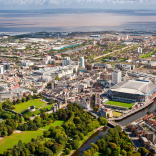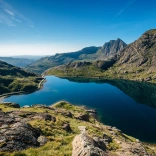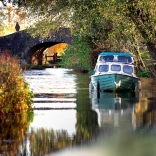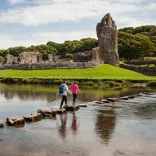Cultural and coastal West Wales is home to our second city, Swansea. Ancient legends inspire contemporary creativity – and colourful seaside villages lead to some of the UK's best beaches. Within the region of West Wales you'll find Carmarthenshire, Neath Port Talbot, Pembrokeshire, and Swansea.
All at sea
Catch the waves at Llangennith on Gower, one of the birthplaces of British surfing. Pembrokeshire is another pioneer. Its rugged cliffs provide the perfect conditions for coasteering, the adrenaline-fuelled activity that sees you clambering over rocks and leaping into the crashing waves below. If you want to explore the coastline up close, Pembrokeshire also offers superb sea-kayaking.


Rolling on
The scenic, traffic-free paths in Llanelli’s Millennium Coastal Park are perfect for two-wheeled exploration. Follow National Cycle Route 4 along the coast for views of Carmarthen Bay and Gower, plus the bird-packed World Wildlife Trust Wetland Centre at Llanelli, the golden sands at Machynys Bay and the pretty marina at Burry Port.


Set sail


Park life
As the UK’s only coastal national park, it’s no surprise that Pembrokeshire still lives up to its medieval description as the “land of magic and enchantment”. Alongside islands, rugged cliffs, secluded coves and award-winning sandy beaches, you’ll find picturesque coastal towns like Saundersfoot and Tenby with its collection of candy-coloured harbourside houses.

Green and gold
Known as the “garden of Wales”, Carmarthenshire is watered by the River Tywi as it threads its way to the sea. It’s a landscape encompassing green spaces like the National Botanic Garden and Aberglasney (the centuries-spanning “garden lost in time”) as well as Carmarthen Bay’s sandy beaches, some of the longest in Wales.


Town and country
Explore Swansea, our city by the sea, before making the short hop on to the glorious Gower Peninsula. The UK’s first designated Area of Outstanding Natural Beauty, its diverse coastline of jagged limestone cliffs, shifting dunes, beaches and briny saltmarsh are spectacular.


The fabric of life
As one of our most widespread and important industries, wool is knitted into Welsh history. Discover its story at the National Wool Museum in the beautiful Teifi Valley. The tradition continues, with a contemporary twist, at Melin Tregwynt near Fishguard, which sells Welsh woollens to the world.
A saintly city
Thanks to its soaring cathedral (dedicated to our patron saint) St Davids is officially the smallest city in the UK. It’s still one of the most important holy sites in Britain, attracting pilgrims from across the globe. St Davids’ stunning peninsula setting, relaxed café culture and arty ambience are a big draw too.

Heavyweight heritage
Start at the prehistoric burial chamber of Pentre Ifan, made from the same Pembrokeshire “bluestones” used at Stonehenge. Then dip into one of our many castles – places like romantic Carreg Cennen, perched on a rocky crag in Carmarthenshire, and monumental Pembroke Castle, birthplace of Henry VII, the Welshman who became the first of the Tudor monarchs.


Local hero
Dylan Thomas was born and bred in Swansea, where you’ll find a visitor centre dedicated to his memory as well as his family home, now a museum. Then travel on to the sleepy seatown of Laugharne and call into the Boathouse where he wrote many of his most celebrated works.


An insider's guide
- Feel the heat. Temperatures are tropical beneath the giant, teardrop-shaped glasshouse, the high-tech centrepiece of Wales’ National Botanic Garden near Carmarthen.
- An Oscar-winning beach. Rhossili, on the tip of Gower, has won almost every “best beach” award you can think of. Gower’s other beaches are pretty good too.
- Don’t miss these three show-stopping features, all close by on Pembrokeshire’s south coast – Bosherston Lakes, the sea-sculpted “Green Bridge of Wales” and Stack Rocks.
- Journey through 300 years of industry and innovation at the National Waterfront Museum in Swansea’s stylish Maritime Quarter.
- Get to know Narberth. With its independent boutiques and funky, foodie atmosphere, this once-sleepy Pembrokeshire market town is now a cosmopolitan shoppers’ paradise.





